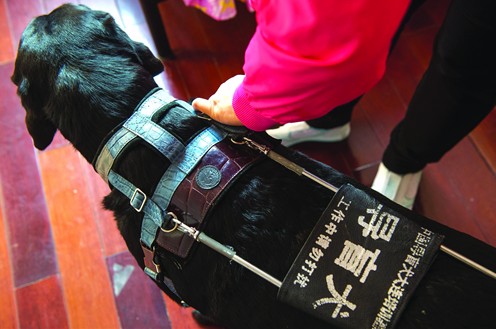 |
| Jennifer is fitted with her guide dog harness. Photo: Li Hao/GT |
Low public awareness
Ping Yali, China's debut Paralympic gold medalist, became the first owner of a guide dog in Beijing when she adopted Lucky in 2006. Two years later, the golden retriever was at Ping's side as she ran in the Paralympic torch relay.
Even though she owns one of Beijing's eight guide dogs, she seldom takes the 10-year-old canine outdoors anymore because of the trouble they face.
"I have no choice. I can't fight with people daily, so now most of the time I leave Lucky at home if I can't arrange for a car to take him. We just spend nights together," sighed Ping, who triumphed in long jump at the 1984 New York Paralympics.
Heading outdoors with Lucky entails more than just fitting the dog with his guide harness.
Ping must also carry many certificates, including Lucky's guide dog license and health certificate, to convince others the pair should be permitted entrance to public places.
Even if the real world can be inhospitable at times to Jennifer, she has at least been warmly received by the online world. The Labrador has her own Sina Weibo account with more than 60,000 followers. She even inspired a book authored by Chen that is told from the dog's perspective titled Mother, I'm Your Eyes (2012).
"There is still low public awareness about guide dogs. People try to touch and even feed guide dogs when they see them in public," said Chen.
Wang noted that China only uses Labradors and golden retrievers as guide dogs, even though overseas other breeds are also trained.
"We don't train German shepherds and giant poodles out of consideration for Chinese people, many of whom are intimidated by their appearance," said Wang.


 2013 Colour Me Rad 5K run held in Canada
2013 Colour Me Rad 5K run held in Canada China's destroyer Qingdao sails out of Sydney Harbor
China's destroyer Qingdao sails out of Sydney Harbor Chinese tycoon aims to restore London's Crystal Palace
Chinese tycoon aims to restore London's Crystal Palace Worst flooding hits Yuyao, 70% of downtown area underwater
Worst flooding hits Yuyao, 70% of downtown area underwater Game for the brave: 'Spiders' in Yandang Mountains
Game for the brave: 'Spiders' in Yandang Mountains Hungarian wingsuit flyer confirmed dead in Zhangjiajie
Hungarian wingsuit flyer confirmed dead in Zhangjiajie New couples take wedding photos during holiday
New couples take wedding photos during holiday Serena Williams stumbles through to quarterfinals
Serena Williams stumbles through to quarterfinals Thailand Mobile Expo 2013 kicks off
Thailand Mobile Expo 2013 kicks off Photo collection of Chinese Navy
Photo collection of Chinese Navy Photo story: Young tenants in Beijing
Photo story: Young tenants in Beijing Twins Culture Festival kicks off in Beijing
Twins Culture Festival kicks off in Beijing UNESCO world heritage site: Montale Tower
UNESCO world heritage site: Montale Tower Israeli drone crashes into Mediterranean, fragments recovered
Israeli drone crashes into Mediterranean, fragments recovered Serena Williams wins second China Open title
Serena Williams wins second China Open titleDay|Week|Month